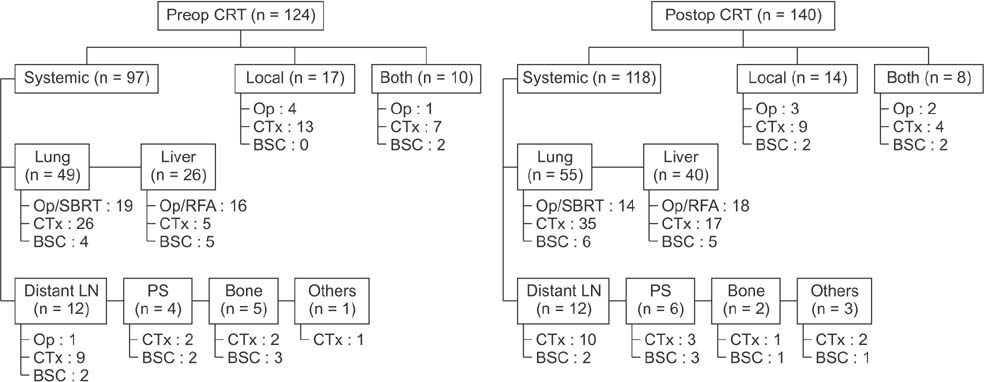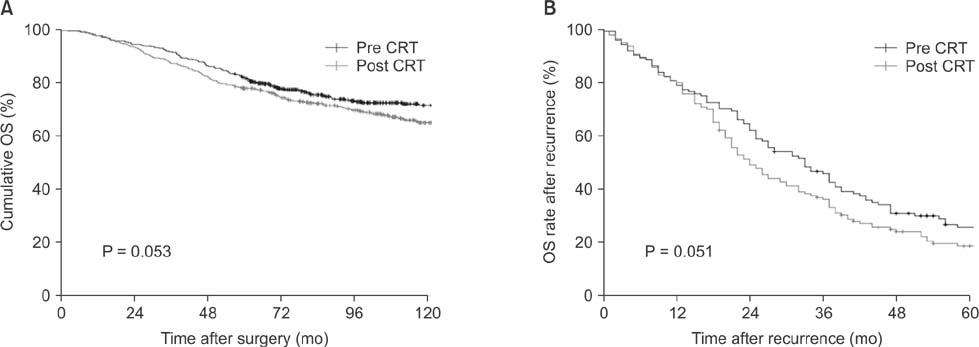Ann Surg Treat Res.
2017 Apr;92(4):200-207. 10.4174/astr.2017.92.4.200.
Matched case-control analysis comparing oncologic outcomes between preoperative and postoperative chemoradiotherapy for rectal cancer
- Affiliations
-
- 1Division of Colon and Rectal Surgery, Department of Surgery, Asan Medical Center, University of Ulsan College of Medicine, Seoul, Korea. jckim@amc.seoul.kr
- KMID: 2374685
- DOI: http://doi.org/10.4174/astr.2017.92.4.200
Abstract
- PURPOSE
To investigate patterns of recurrence and oncologic outcomes after recurrence between preoperative and postoperative chemoradiotherapy (CRT).
METHODS
Records of patients with stage II or III locally advanced rectal cancer seen between January 2000 and December 2010 were analyzed. The outcomes for patients undergoing preoperative CRT followed by radical resection (n = 466) were compared with outcomes of patients matched for sex, age, and stage who had surgery and then postoperative CRT (n = 466). Recurrence rates and sites, treatment of recurrence, and oncologic outcomes after recurrence were investigated. The rate of sphincter preservation and permanent stoma formation were also evaluated.
RESULTS
Recurrence occurred in 124 and 140 patients in the pre- and postoperative CRT groups, respectively. The local and systemic recurrence rates were 3.6% and 20.8%, respectively, in the preoperative CRT group and 3.0% and 25.3%, respectively, in the postoperative CRT group (P = 0.245). Time to recurrence was longer in the postoperative CRT group (19 months vs. 24.2 months, P = 0.029). The overall rates of sphincter preservation (sphincter preservation operation and postoperative permanent stoma formation) did not significantly different between the two groups (P = 0.381). The 5-year overall survival rate after recurrence did not differ between the two groups (25.6% vs. 18.6%, P = 0.051).
CONCLUSION
Preoperative and postoperative CRT are both safe and suitable treatment methods for rectal cancer, so the choice can be tailored to the patient's situation.
MeSH Terms
Figure
Reference
-
1. Heald RJ, Ryall RD. Recurrence and survival after total mesorectal excision for rectal cancer. Lancet. 1986; 1:1479–1482.2. Obrand DI, Gordon PH. Incidence and patterns of recurrence following curative resection for colorectal carcinoma. Dis Colon Rectum. 1997; 40:15–24.3. Tjandra JJ, Chan MK. Follow-up after curative resection of colorectal cancer: a meta-analysis. Dis Colon Rectum. 2007; 50:1783–1799.4. Sauer R, Becker H, Hohenberger W, Rodel C, Wittekind C, Fietkau R, et al. Preoperative versus postoperative chemoradiotherapy for rectal cancer. N Engl J Med. 2004; 351:1731–1740.5. Kobayashi H, Mochizuki H, Sugihara K, Morita T, Kotake K, Teramoto T, et al. Characteristics of recurrence and surveillance tools after curative resection for colorectal cancer: a multicenter study. Surgery. 2007; 141:67–75.6. Merkel S, Mansmann U, Hohenberger W, Hermanek P. Time to locoregional recurrence after curative resection of rectal carcinoma is prolonged after neoadjuvant treatment: a systematic review and meta-analysis. Colorectal Dis. 2011; 13:123–131.7. Yeo SG, Kim MJ, Kim DY, Chang HJ, Kim MJ, Baek JY, et al. Patterns of failure in patients with locally advanced rectal cancer receiving pre-operative or post-operative chemoradiotherapy. Radiat Oncol. 2013; 8:114.8. Roh MS, Colangelo LH, O'Connell MJ, Yothers G, Deutsch M, Allegra CJ, et al. Preoperative multimodality therapy improves disease-free survival in patients with carcinoma of the rectum: NSABP R-03. J Clin Oncol. 2009; 27:5124–5130.9. Park JH, Yoon SM, Yu CS, Kim JH, Kim TW, Kim JC. Randomized phase 3 trial comparing preoperative and postoperative chemoradiotherapy with capecitabine for locally advanced rectal cancer. Cancer. 2011; 117:3703–3712.10. Guillem JG, Chessin DB, Cohen AM, Shia J, Mazumdar M, Enker W, et al. Long-term oncologic outcome following preoperative combined modality therapy and total mesorectal excision of locally advanced rectal cancer. Ann Surg. 2005; 241:829–836.11. Sadahiro S, Suzuki T, Ishikawa K, Nakamura T, Tanaka Y, Masuda T, et al. Recurrence patterns after curative resection of colorectal cancer in patients followed for a minimum of ten years. Hepatogastroenterology. 2003; 50:1362–1366.12. Weiss L, Grundmann E, Torhorst J, Hartveit F, Moberg I, Eder M, et al. Haematogenous metastatic patterns in colonic carcinoma: an analysis of 1541 necropsies. J Pathol. 1986; 150:195–203.13. Cho YB, Chun HK, Yun HR, Lee WS, Yun SH, Lee WY. Clinical and pathologic evaluation of patients with recurrence of colorectal cancer five or more years after curative resection. Dis Colon Rectum. 2007; 50:1204–1210.14. Seo SI, Lim SB, Yoon YS, Kim CW, Yu CS, Kim TW, et al. Comparison of recurrence patterns between ≤5 years and >5 years after curative operations in colorectal cancer patients. J Surg Oncol. 2013; 108:9–13.15. Ding P, Liska D, Tang P, Shia J, Saltz L, Goodman K, et al. Pulmonary recurrence predominates after combined modality therapy for rectal cancer: an original retrospective study. Ann Surg. 2012; 256:111–116.16. Hwang MR, Park JW, Kim DY, Chang HJ, Hong YS, Kim SY, et al. Prognostic impact of peritonealisation in rectal cancer treated with preoperative chemoradiotherapy: extraperitoneal versus intraperitoneal rectal cancer. Radiother Oncol. 2010; 94:353–358.17. Bipat S, Glas AS, Slors FJ, Zwinderman AH, Bossuyt PM, Stoker J. Rectal cancer: local staging and assessment of lymph node involvement with endoluminal US, CT, and MR imaging--a meta-analysis. Radiology. 2004; 232:773–783.18. Bosset JF, Calais G, Mineur L, Maingon P, Radosevic-Jelic L, Daban A, et al. Enhanced tumorocidal effect of chemotherapy with preoperative radiotherapy for rectal cancer: preliminary results--EORTC 22921. J Clin Oncol. 2005; 23:5620–5627.19. Filippone A, Ambrosini R, Fuschi M, Marinelli T, Genovesi D, Bonomo L. Preoperative T and N staging of colorectal cancer: accuracy of contrast-enhanced multi-detector row CT colonography--initial experience. Radiology. 2004; 231:83–90.20. Lim SB, Yu CS, Hong YS, Kim TW, Park JH, Kim JH, et al. Failure patterns correlate with the tumor response after preoperative chemoradiotherapy for locally advanced rectal cancer. J Surg Oncol. 2012; 106:667–673.21. Yoon WH, Kim HJ, Kim CH, Joo JK, Kim YJ, Kim HR. Oncologic impact of pathologic response on clinical outcome after preoperative chemoradiotherapy in locally advanced rectal cancer. Ann Surg Treat Res. 2015; 88:15–20.22. Crane CH, Skibber JM, Birnbaum EH, Feig BW, Singh AK, Delclos ME, et al. The addition of continuous infusion 5-FU to preoperative radiation therapy increases tumor response, leading to increased sphincter preservation in locally advanced rectal cancer. Int J Radiat Oncol Biol Phys. 2003; 57:84–89.23. Weiser MR, Quah HM, Shia J, Guillem JG, Paty PB, Temple LK, et al. Sphincter preservation in low rectal cancer is facilitated by preoperative chemoradiation and intersphincteric dissection. Ann Surg. 2009; 249:236–242.
- Full Text Links
- Actions
-
Cited
- CITED
-
- Close
- Share
- Similar articles
-
- Impairment of Immunonutritional Status During Treatment is a Factor Associated With Oncologic Outcomes in Patients With Rectal Cancer Treated With Preoperative Chemoradiotherapy
- An Update on Preoperative Radiotherapy for Locally Advanced Rectal Cancer
- Surgical issues in locally advanced rectal cancer treated by preoperative chemoradiotherapy
- Radiation Therapy for Rectal Cancer
- Results of Preoperative Chemoradiotherapy in Low Rectal Cancer



